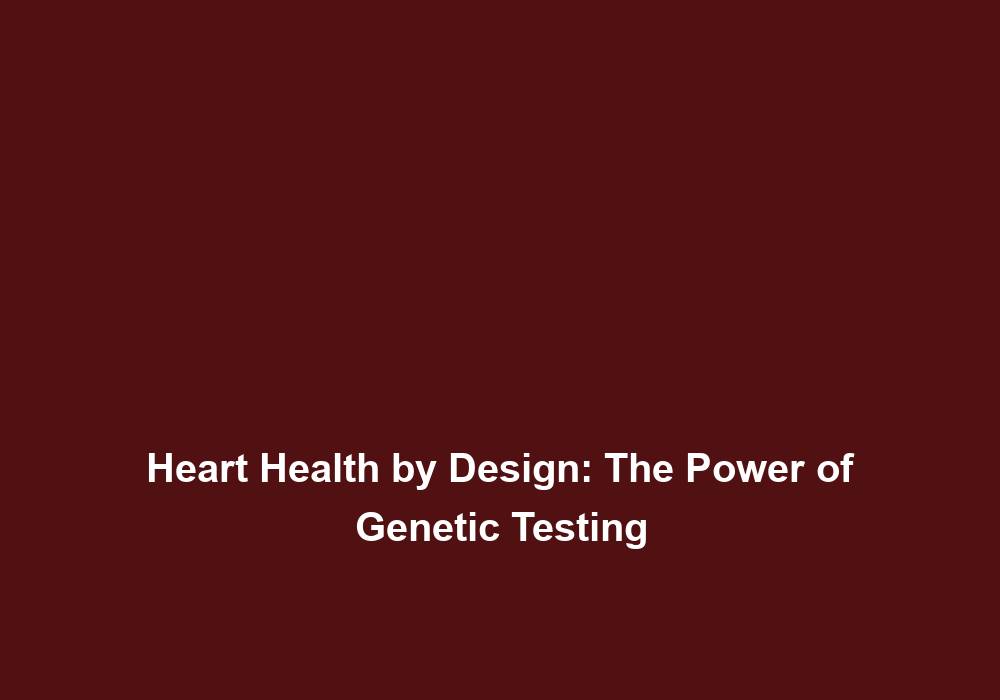Heart Health by Design: The Power of Genetic Testing
Genetic testing has emerged as a groundbreaking tool in the field of healthcare, revolutionizing the way we understand and manage various health conditions. In the realm of heart health, genetic testing has proven to be invaluable, providing crucial information that can guide diagnosis, treatment, and prevention strategies. This article will delve into the power of genetic testing in assessing heart health, uncovering hidden risks, and tailoring personalized interventions.
Understanding Genetic Testing
Genetic testing involves analyzing an individual’s DNA to identify any variations or mutations that may be associated with certain health conditions, including heart diseases. This non-invasive procedure can be conducted through a simple blood sample or saliva test, making it easily accessible to individuals seeking to optimize their heart health.
Genetic testing provides a deeper understanding of an individual’s genetic makeup and helps identify specific genetic markers linked to heart conditions. By analyzing the DNA, healthcare providers can assess an individual’s risk level and develop targeted prevention strategies. This enables a proactive approach to heart health and empowers individuals to take control of their well-being.
Unveiling Hidden Risks
One of the primary benefits of genetic testing in relation to heart health is the ability to uncover hidden risks. While lifestyle factors and environmental influences play a significant role in heart disease development, genetic predispositions can also contribute to an individual’s susceptibility. By identifying specific genetic markers linked to heart conditions, healthcare providers can assess an individual’s risk level and develop targeted prevention strategies.
Genetic testing allows healthcare providers to identify individuals who may be at a higher risk of developing heart diseases even before symptoms manifest. This early detection enables prompt interventions, potentially preventing or minimizing the impact of these conditions. By combining genetic information with lifestyle factors and other risk indicators, healthcare providers can develop comprehensive strategies to optimize heart health.
Personalized Approach to Prevention
Genetic testing empowers healthcare professionals to develop personalized prevention plans based on an individual’s unique genetic makeup. By identifying genetic variants associated with heart diseases, healthcare providers can determine the most effective interventions and lifestyle modifications to mitigate risks. This personalized approach allows for precision medicine, optimizing the efficacy of interventions and reducing the burden of heart disease.
Lifestyle Modifications
Armed with the knowledge gained from genetic testing, individuals can make informed decisions about their lifestyle to improve heart health. For example, if genetic testing reveals a higher risk for cardiovascular diseases, healthcare providers can recommend specific dietary changes, exercise regimes, and stress management techniques to reduce susceptibility.
Implementing lifestyle modifications tailored to an individual’s genetic predispositions can significantly reduce the risk of developing heart conditions. This may include adopting a heart-healthy diet rich in fruits, vegetables, and whole grains, engaging in regular physical activity, managing stress effectively, and avoiding tobacco and excessive alcohol consumption.
Medication Selection
Genetic testing also aids in the selection of appropriate medications to manage heart conditions. Certain genetic variants can impact an individual’s response to particular medications, making it crucial to tailor treatment plans accordingly. By analyzing an individual’s genetic profile, healthcare providers can determine which medications are most likely to be effective, minimizing the need for trial and error.
The ability to choose the most suitable medication based on an individual’s genetic makeup improves treatment outcomes and reduces the risk of adverse reactions. This personalized approach ensures that individuals receive the most effective treatment for their specific heart condition, leading to better overall health outcomes.
Early Detection and Treatment
Genetic testing plays a pivotal role in the early detection and treatment of heart diseases. Certain genetic variations can indicate an increased risk of developing specific heart conditions, allowing healthcare providers to initiate preventative measures and close monitoring at an earlier stage.
Inherited Conditions
Genetic testing is particularly valuable in identifying inherited heart conditions. By analyzing an individual’s DNA for specific gene mutations associated with inherited heart diseases, healthcare providers can identify at-risk individuals, even before symptoms manifest. Early detection enables prompt interventions, potentially preventing or minimizing the impact of these conditions.
Early detection of inherited heart conditions through genetic testing allows healthcare providers to implement appropriate management strategies. This may include regular monitoring, lifestyle modifications, and the use of targeted medications to effectively manage the condition and reduce the risk of complications.
Precision Treatment
In addition to aiding early detection, genetic testing assists in tailoring precision treatments. By analyzing an individual’s genetic profile, healthcare providers can determine the most appropriate medications and interventions to manage heart conditions effectively. This targeted approach improves treatment outcomes and reduces the risk of adverse reactions.
Tailoring treatment plans based on an individual’s genetic makeup ensures that the chosen interventions are more likely to be effective and well-tolerated. This precision treatment approach maximizes the benefits of medical interventions while minimizing potential side effects, leading to improved patient outcomes.
A Holistic Perspective on Heart Health
Genetic testing offers a holistic perspective on heart health, combining genetic information with lifestyle factors and other risk indicators. By considering an individual’s genetic predispositions alongside traditional risk factors such as cholesterol levels, blood pressure, and family history, healthcare providers can develop comprehensive strategies to optimize heart health.
Comprehensive Risk Assessment
Genetic testing enhances risk assessment by providing valuable insights into an individual’s genetic predispositions. This information, combined with other risk factors, allows healthcare providers to gain a more comprehensive understanding of an individual’s overall risk for heart diseases. This comprehensive approach enables the implementation of targeted interventions at an earlier stage.
By assessing an individual’s genetic predispositions alongside traditional risk factors, healthcare providers can develop a personalized risk assessment. This comprehensive evaluation helps identify the most appropriate interventions and lifestyle modifications to reduce the risk of heart diseases and improve overall heart health.
Empowering Patients
Genetic testing empowers individuals to take an active role in their heart health. By gaining a deeper understanding of their genetic makeup, individuals can make informed decisions about their lifestyle, seek appropriate medical interventions, and engage in preventative measures. This empowerment fosters a proactive approach to heart health, leading to better outcomes and improved quality of life.
The knowledge gained from genetic testing enables individuals to make informed decisions about their heart health. They can actively participate in their own well-being by adopting healthy lifestyle habits, adhering to personalized prevention plans, and engaging in regular monitoring. This empowerment fosters a sense of control and leads to better heart health outcomes.
In conclusion, genetic testing has revolutionized the field of heart health by providing valuable insights into an individual’s genetic predispositions and hidden risks. Through personalized prevention plans, early detection, and precision treatment, genetic testing offers a powerful tool in the fight against heart diseases. By embracing this technology, individuals and healthcare providers can work together to optimize heart health and pave the way for a healthier future.







